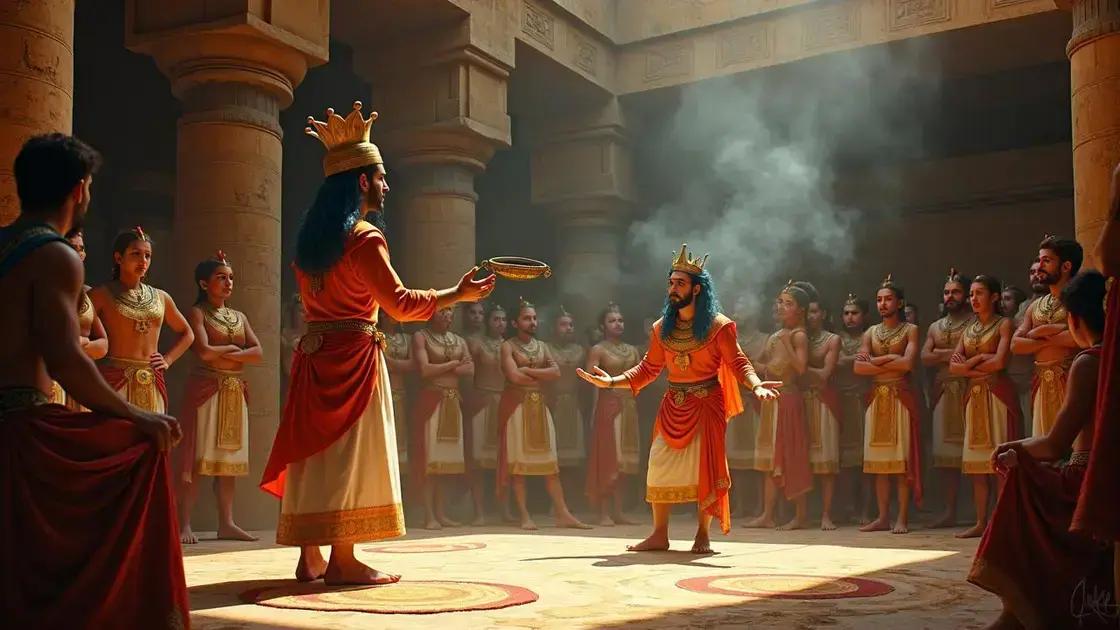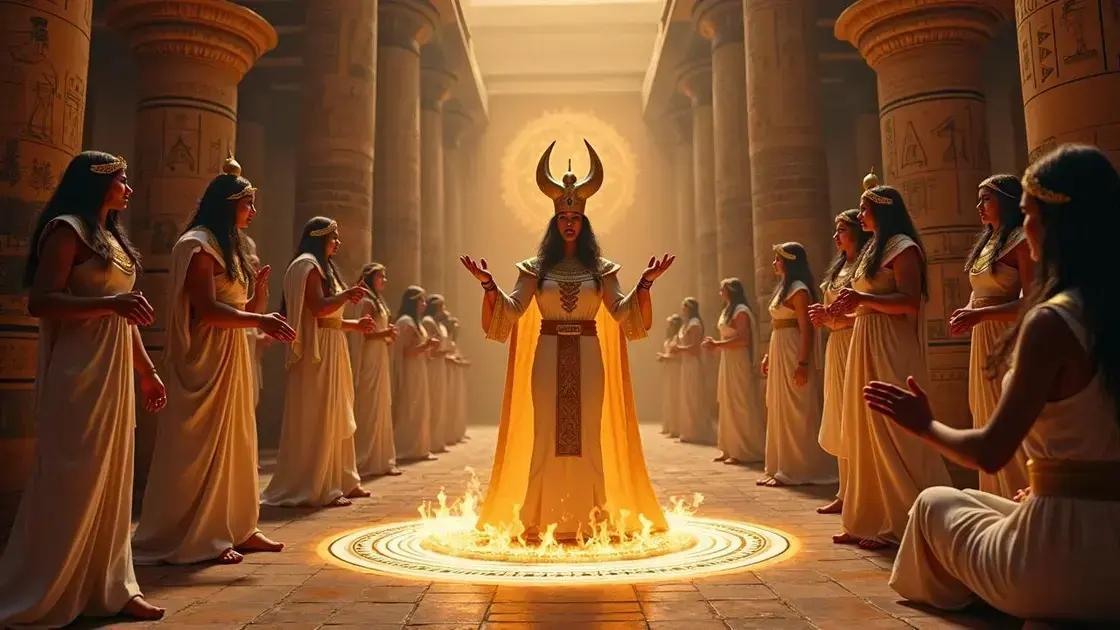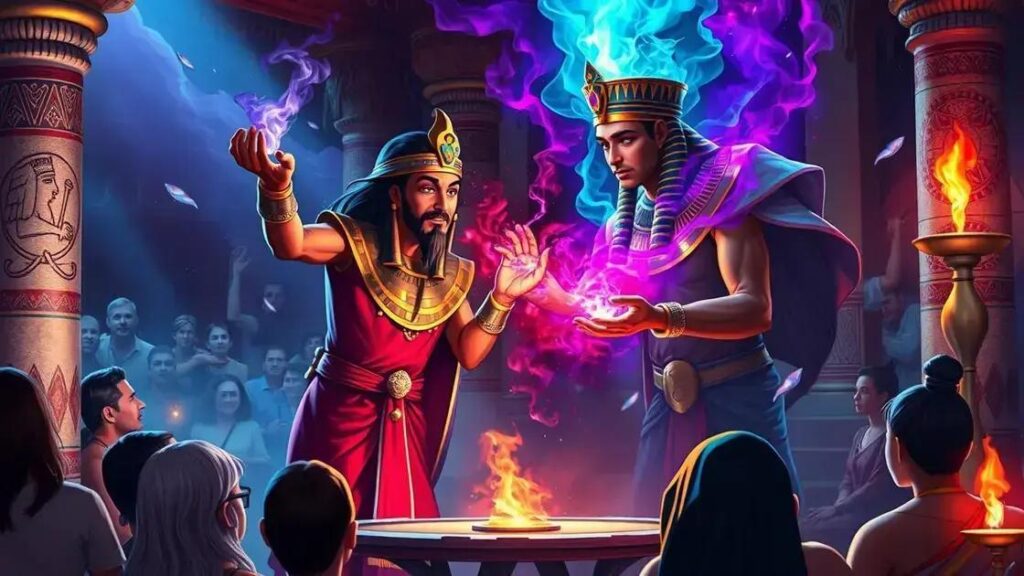The Trick of the Egyptians is an ancient form of magic that captivates audiences through psychological techniques, historical significance, and engaging storytelling, making it effective in evoking wonder and challenging perceptions in both ancient and modern performances.
The magic tricks of the Egyptians have fascinated people for centuries, blending art, illusion, and history into a captivating spectacle. Many wonder, what makes the Trick of the Egyptians effective? This article will delve into the techniques, historical backgrounds, and psychological strategies that make these ancient tricks so mesmerizing. Let’s uncover the secrets of this intriguing form of entertainment.
Understanding the Trick of the Egyptians

The Trick of the Egyptians is a fascinating blend of art, skill, and historical intrigue. It often relies on clever techniques and misdirection to captivate audiences and create an unforgettable experience. Many ancient Egyptian magicians used everyday objects in innovative ways, leading to awe-inspiring illusions.
Key Techniques Used in Egyptian Magic
One of the notable techniques involves sleight of hand. This skill allows the magician to manipulate objects without the audience noticing, creating a sense of wonder. Additionally, the use of props such as ropes, cups, and even live animals enhanced the magic and created surprising effects.
Illusions and Audience Engagement
Magicians often engaged their audience by making them part of the performance. This interaction heightened the sense of mystery and connection. The Trick of the Egyptians relied on storytelling, drawing spectators into a narrative that made the illusions more impactful.
Learning from the Past
Today, performers still study these ancient tricks to learn about timing, audience awareness, and presentation styles. By understanding the foundational elements of Egyptian magic, modern magicians can adapt these methods to contemporary performances, keeping the spirit of the original tricks alive while captivating new audiences.
Historical Significance of the Trick

The historical significance of the Trick has roots that go deep into the culture of ancient Egypt. Magic was not just entertainment; it played a role in religious ceremonies and daily life. These illusions often carried meanings that related to the afterlife and the gods.
Magic in Religious Rituals
In ancient Egypt, magicians were highly regarded. They performed tricks during rituals to demonstrate power over the forces of nature. Such acts were believed to appease the gods and ensure favorable conditions for harvests, health, and prosperity. The tricks often symbolized the eternal struggle between good and evil.
Societal Impact of Magic
The Trick of the Egyptians also reflected social status. Skilled magicians held important positions in society and could influence social gatherings. Their ability to entertain helped them gain favor with both common folk and elite figures.
Preservation of Cultural Heritage
These tricks and practices were preserved through oral traditions and drawings. Artifacts indicate that Egyptian magic was recorded in hieroglyphs, allowing future generations to learn about these ancient practices. Today, understanding this historical context helps us appreciate the depth behind the tricks performed.
Psychological Aspects Behind the Trick

The psychological aspects behind the Trick are crucial in understanding its effectiveness. Magicians often utilize principles of psychology to create wonder and amazement. This manipulation of perception engages the audience on a deep level, making the experience memorable.
Attention and Focus
One key element in magic is attention. Magicians direct the audience’s focus away from the actual trick while performing. This redirection allows tricks to occur without the audience noticing, creating the illusion of magic. By understanding where people look and what captures their interest, magicians control the narrative.
Emotional Engagement
Emotions play a significant role in the effectiveness of magic. When a magician creates suspense or excitement, it enhances the audience’s experience. The anticipation builds excitement, making the reveal of the trick even more impactful. Emotional responses lead to stronger memories of the performance.
The Power of Suggestion
Another psychological aspect is the power of suggestion. Skilled magicians use verbal cues and body language to suggest certain outcomes. This technique can lead spectators to believe they have witnessed something supernatural. The mind fills in the gaps, leading to a heightened sense of amazement.
In Summary: The Allure of the Trick of the Egyptians
The Trick of the Egyptians continues to captivate audiences around the world, blending history, psychology, and artistry. Understanding the techniques and historical significance enhances our appreciation for this ancient craft.
The psychological elements, such as attention manipulation and emotional engagement, are key to the effectiveness of these tricks. By mastering these aspects, magicians keep the spirit of ancient Egyptian magic alive, creating experiences that are both enchanting and memorable.
Ultimately, the enduring appeal of these tricks lies in their ability to evoke wonder and challenge our perceptions of reality, reminding us of the magic that exists in storytelling and performance.
FAQ – Frequently Asked Questions about the Trick of the Egyptians
What is the Trick of the Egyptians?
The Trick of the Egyptians refers to ancient magic practices that combine illusion, storytelling, and psychological techniques to captivate audiences.
How were these tricks used in ancient Egypt?
In ancient Egypt, magicians performed tricks during religious ceremonies and social events to entertain and demonstrate their powers, often linking them to worship.
What psychological techniques do magicians use?
Magicians often use techniques like attention manipulation, emotional engagement, and the power of suggestion to create effective illusions and enhance audience experience.
Why are these tricks effective today?
The lasting appeal of these tricks comes from their ability to evoke wonder and challenge perceptions, making them relevant in modern entertainment.
How can modern magicians learn from ancient techniques?
Modern magicians study ancient techniques to understand foundational principles of magic, allowing them to adapt these methods in their performances today.
What role does audience engagement play in magic?
Audience engagement is vital as it heightens emotional responses, making the performance more impactful and memorable.













